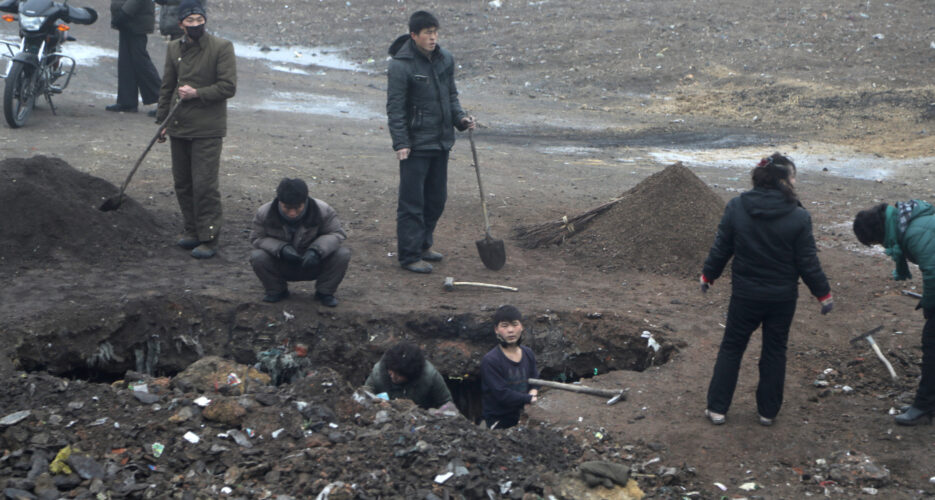North Korea makes US human trafficking blacklist for third straight year
DPRK one of 11 countries named as state sponsor of forced labor and trafficking in annual State Department report
Thomas Maresca July 20, 2022

SHARE
North Koreans engage in manual labor in Wonsan in Jan. 2018 | Image: NK News
North Korea remains on a short list of countries that are the worst offenders in human trafficking and forced labor, an annual report by the U.S. State Department released Tuesday states.
The DPRK is one of 11 governments with a state-sponsored “policy or pattern” of trafficking, making the blacklist for the third straight year, according to the 2022 Trafficking in Persons (TIP) report.
“In 11 countries, the government subjects its own people to trafficking — for example, as retaliation for political expression or through forced labor on projects of national interest,” U.S. Secretary of State Antony Blinken said during a launch ceremony in Washington.
“It can also mean deploying workers around the world without telling them where they’re going or what they’ll be doing, confiscating passports and salaries, forcing them into dangerous work conditions and constantly monitoring their movements,” he said.
The State Department has published the annual TIP report since 2001 as a requirement of the Trafficking Victims Protection Act (TVPA). This year’s report, the 22nd installment, includes profiles of 188 countries and territories, including the United States.
North Korea has been on the State Department’s short list since 2020. It is joined this year by Afghanistan, China, Cuba, Eritrea, Iran, Myanmar, Russia, South Sudan, Syria and Turkmenistan.
The DPRK also maintained its lowest overall Tier 3 designation, reserved for governments that do not fully meet the TVPA’s minimum standards and are not making significant efforts to do so. The U.S. has placed North Korea in Tier 3, which subjects nations to additional U.S. sanctions, since the report’s launch in 2001.
This year’s report highlights North Korean practices such as forced labor at prison camps and mass mobilizations of workers for public projects, including school children. The COVID-19 pandemic has exacerbated these forced labor trends, according to the State Department.
“Authorities allegedly treat individuals who do not wear face masks or who are found to violate quarantine rules as criminals guilty of political crimes and send them to political prison camps where they are subjected to a minimum of three months’ forced labor,” the report said.
DPRK workers also continue to be sent overseas despite U.N. Security Council prohibitions, where they are subject to excessive hours, hazardous conditions and limited freedom of movement, according to the report.
The report states that Russia and China remain the main destinations for DPRK laborers, with an estimated 20,000-100,000 North Koreans working in China alone, primarily in restaurants and factories. But North Koreas are also reported in countries including Algeria, Benin, Cameroon, Indonesia, Iran, Laos, South Sudan, Syria and Tanzania.
The DPRK government allegedly withholds up to 90 percent of wages from overseas workers, who generate an annual revenue of hundreds of millions of dollars for the regime, according to the report.
While pandemic-related border closures significantly limited escape attempts through China, PRC authorities continued to detain and forcibly return some asylum seekers to North Korea, where they will likely face “severe punishment or death, including in forced labor camps,” the TIP report states.
Traffickers also operate networks spanning both countries to recruit women and girls to smuggle into China for sex work or arranged marriages, the report added.
Meanwhile, a new bipartisan bill to reauthorize the North Korean human rights act for another five years has passed the U.S. Senate’s Committee on Foreign Relations, the office of Senator Marco Rubio announced on Tuesday.
In its current form, the bill would require presidential administrations to report on progress toward appointing a special envoy for North Korean human rights, a position that has been vacant since 2017, and to release a report on humanitarian assistance to the DPRK.
Edited by Bryan Betts
Updated at 9:12 a.m. KST on July 20, 2022 with additional details from report, announcement about U.S. bill on North Korean human rights.
No comments:
Post a Comment